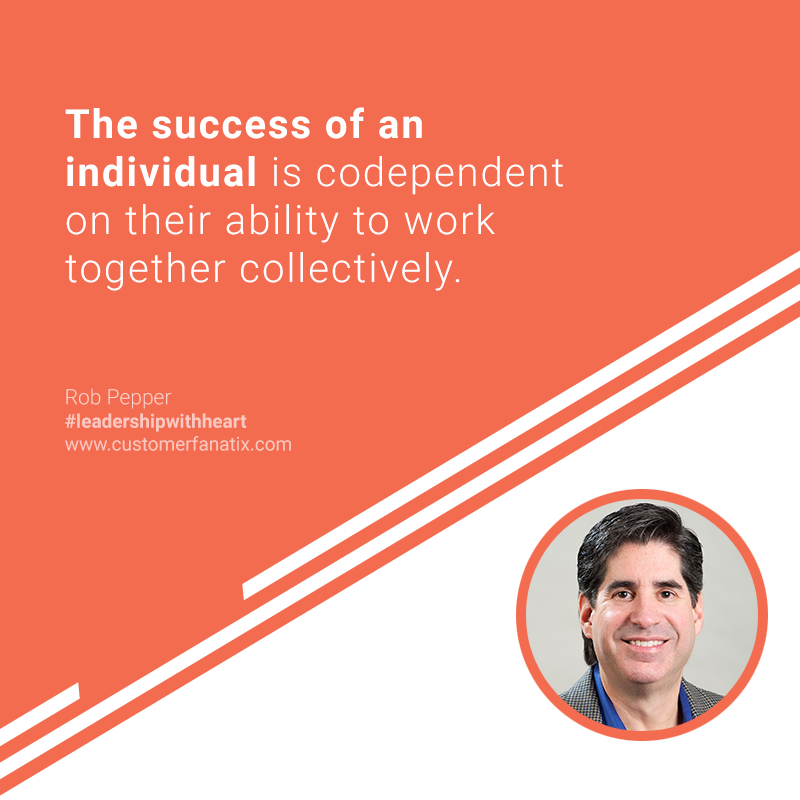Leaders need to focus on rolling up their sleeves, showing up, having that vulnerability to ask for help, recognizing their team members and meeting them where they are. We need to take the time to emotionally connect with our team, not just in the area of business, but also about their personal lives.
This is what we need to do to create loyal and engaged employees.
Our guest for today is Rob Pepper. If you’re looking for a leader who listens well, puts co-workers first, and empowers people to be the best version of themselves, then you’re at the right place.
Rob Pepper is an award-winning executive, revenue growth strategist, and business transformational leader in the mid-size emerging technology and services markets. His accomplishments have been nationally recognized. He is the recipient of numerous multi-industry and leadership awards for his contributions in accelerating growth for innovative driven companies.
Building and managing high-growth sales, marketing and product organizations that deliver extraordinary growth is Rob’s passion and expertise. Rob has been recruited by CEOs of public and private emerging and mature B2B technology companies to provide high performance leadership and direction to support growth and market expansion.
Rob is known as a visionary sales, marketing and financial strategist as well as motivational leader who builds strong internal teams and partnerships to consistently deliver exceptional results. Rob’s contributions have been instrumental in growing several ventures including three being acquired by Fortune 500 companies.
In this episode, we talk about interdependency in teams, how recognition promotes excellence, why you should take a closer look at a company’s culture before joining them, and a lot more.
Click the play button below to listen to the episode!
Building an ecosystem of dependency
I asked Rob what drives him as a leader, and he shares that he’s just generally interested in learning and challenging himself and pushing the boundaries of companies, especially innovative companies.
“The way I have grown my career and excelled is really by surrounding myself with super talented individuals.
My driver, for me, is really focused on the core value of developing a winning culture with a great deal of accountability, empowerment and quantifying results at the end that we can measure our performance by.
When I look at leading teams, and recruiting teams, there is an interdependency on each other where it’s mandatory.”

The success of an individual is codependent on their ability to work together collectively. Share on X
What I’m really looking to do is create folks to be high-performers and contributors, and I believe that everyone can be high performers in one way or another. Share on X
It is a leader’s responsibility to teach and learn
I would say that the most critical factor in achieving success in any company you’re with is your team, and who you select to be on that team. Share on X
“As leaders, it’s our responsibility to be teachers. We’re coaches, we’re mentors, and more importantly, we’re students.
For me, I’m driven to encourage and empower others and provide what I would call the fuel behind them.”
Get comfortable being uncomfortable. Try something new, be different. Share on X
If we can focus on what the team can do together, the organization thrives more. Share on X
Take a look into the company’s culture
When Rob was in his late 20s, he joined a very prestigious investment bank as an executive. He had other leadership roles, but when he came to this organization he had spent a lot of time interviewing for the leadership team.
“I made the decision based on the interviews I had with the C-suite. So when I arrived and assumed my new leadership position in this company, I learned who my team was.
I had learned that the board and executive committee wanted to change the direction of the company, which I understood going into this role. But what I learned was that the staff, the folks who were going to make it happen, were not on board. They resisted, and I found myself in a position where I had to do transformation leadership.
I found that the people just wanted to come in and do their job and have a nice life and not worry about making changes that they felt would perhaps jeopardize their career or their role, or perhaps make their daily performance different than what they’ve done for the last 10, 15, 20 years.
So the change was resisted and it wasn’t just in my division; it was across the company. It was a very difficult time.”
The moral of the story was to look deep into a company’s culture, and culture can mean lots of things. It can mean the culture against people, growth, education, maintaining market share, or something else. Look deep into the company’s culture before joining to ensure there’s congruency between the leadership team and the rest of the organization.
Step back, look at what your options are and evaluate, 'Does this align with my leadership brand?' Share on X
More tweetables
A happy team is a productive team. Share on X
When I get out of sync, I do the one simple thing: I ask my team for help. Share on X
Leaders are only as strong as their teams. Share on X
Mentions
Connect with Rob on LinkedIn